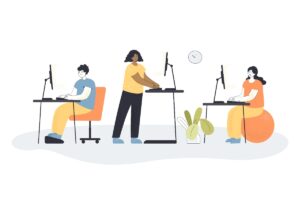As we move through the phases of the pandemic it feels we might start to see the light of recovery around the corner.
As we approach this time we’ve spoken to global thought-leader, Geoff McDonald, to better understand the priorities he envisages for organisational thinking as this change of focus approaches. Here you can read the conversation between Geoff and Kate Hesk, Co-Founder of Cognomie.
If you don’t know Geoff, you can find many of his talks online, including his TED talk on reducing the stigma too often associated with talking about mental health in the workplace – https://www.ted.com/talks/geoff_mcdonald_let_s_talk_about_mental_health
Kate Hesk: Given the year we’ve just had Geoff, what do you see as the key elements that will set this year apart from the one just gone for organisations?
Geoff McDonald: Recognising that different countries and systems, as well as organisations, are at different stages of recovery, it is essential that all organisations quickly start to consider this approaching phase now. How might they will support and enable individual employees to build their Mental Fitness to drive both their personal performance, and in turn organisational performance in the future.
We all recognise that last year, for the greatest part, was very much about crisis management for many organisations. We now turn our thinking to preparation for return and recovery, a shift towards a need to prepare.
We need to shift our thinking and strategies that worked through the first year of the pandemic, which predominantly consisted of react and respond and crisis management, to this year finding space to plan positively and prepare for the recovery that’s coming – to what we hope is more business as usual.
Organisations need to be considering what the new focus for them should be and specifically how they will support and enable individuals to restore and renew their personal capacity and build Mental Fitness to enable recovery.
Kate Hesk: What are the key questions should organisations be asking themselves?
Geoff McDonald: How will you balance remote and office working in the future?
How will you support individuals to be able to return to equilibrium/ balance and to manage their energy and resilience to be able to give their best?
How will you support them to rebuild their energy and to reconnect with each other?
Let’s start with – Where are we now? Survey staff to identify the strengths within teams and across the organisation. Also identify pockets which may need further support (areas of the organisation/ teams/ departments/ functions), around specific aspects of Mental Fitness, i.e. relationships, motivation, optimism, communication, stress, anxiety and resilience.
We can use the Mental Fitness framework as the foundation to benchmark the current climate and performance not just from a mental health perspective, but from a holistic approach that considers all factors that can contribute to helping us achieve our potential, at both home and in our working lives. This includes areas such as confidence, optimism, anxiety and physical fitness.
We can start to build a framework to our approach for this new phase, to help us to structure and attain a more quantifiable outcome.
Start with an audit of your organisation, to allow you to create a benchmark. Where do we need to focus our energy in providing support and development? What are the areas that teams and individuals are struggling with following last year?
From here we can aim to build focussed capability, to renew and rebuild, where development is needed most.
Using the baseline developed from an initial audit, we can track and measure development progress. Revisiting the audit to see what progress is being made as the year progresses.
Kate Hesk: We’re talking about organisational strategies here, but last year’s pandemic was a personal challenge to many, that has unique personal elements to each individual’s experience of it. How do we need to take this into consideration as we approach this work?
Geoff McDonald: Physical, emotional and psychological wellbeing will be key to enabling individuals and organisations to recover. This is going to be slightly different for each individual. The more we can customise this work to meet those needs, the more effective the development will be. However, we also need to be practical about how this can be approached in a large organisation.
In the first instance, making inclusive programmes will ensure no one gets left out. Then the more personalised we can make the support, recognising individual differences and needs, beyond the core elements of the programme, the more effective it will be.
Framing this in a Mental Fitness preparation and conditioning approach, leading to prevention and managed development. Rather than crisis and mental illness management or, for want of a better description, mental health first aid.
Kate Hesk: So, who is responsible for this type of work? Are we all responsible? Or is this just the domain of those organisations that were on the front line during the crisis stage of the pandemic?
Geoff McDonald: No. We all face the responsibility to help recovery within our organisations. Being able to reset, to restore and renew are shared responsibilities we all have.
However, we will see a difference between those organisations that take this role proactively, versus those waiting for a demand from within the organisation and reacting to that demand.
Those proactive organisations will make a noticeably more rapid recovery and will thrive again quickly. Those who create a framework for recovery and then support and enable individuals to be empowered to take responsibility for their own recovery and renewal. It’s these organisations that will see the most reward from the coming year ahead.
Individual awareness is essential. Understanding our own emotional and psychological responses and building personal capacity to make the necessary shifts. This starts with asking the right questions and building conversations to help build responsibility and ownership. Organisations have a duty of care to support individuals and enable collective effort to ‘reboot’ and renew. It’s easy to look at the bottom-line and say we can’t afford to invest in this, but the potential consequences of not supporting employees back to productive working will be felt long into the future.
Kate: Thanks Geoff for taking the time to talk to us today. If you could close on a thought that we should all consider as we move into this next phase, what would it be?
The pandemic has shown us that the most valuable asset an organisation has, is the health (wellbeing) of their people. It is the most critical enabler of performance. It has cost business and governments billions! If it is such a critical enabler of performance and we want to mitigate the risk and cost that unhealthy employees bring to our businesses, why is it not a strategic priority across every workplace? I trust the opportunity that the pandemic offers is that every workplace will in future move beyond wellbeing and health being a “tick a box” exercise, and become a strategic priority, where work then enhances one’s life, and in so doing drives improved productivity and performance.



















